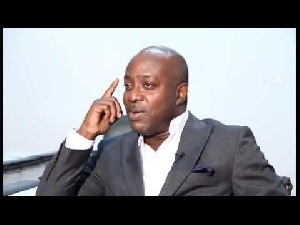The Bank of Ghana (BoG) cannot place a cap on lending rates as the Association of Ghana Industries (AGI) is demanding, Managing Director of CAL Bank Frank Adu has said -- asking for better economic management instead.
Major industry-lobby AGI has been preparing to meet the central bank to urge it to place a threshold on the lending rates of banks in the country, so that companies can have access to cheaper credit.
Fank Adu however told journalists on the sidelines of bank’s Facts behind the Figures event that “If you govern properly, do right by the economy and inflation drops, the cedi is stable and debt is low, interest rates will automatically drop”.
After years of fruitless appeals to commercial banks to reduce their lending rates in order to spur growth in the private sector and the economy in general, the AGI is now taking the fight to a different level by calling for a meeting with management of the Central Bank.
The President of AGI, James Asare-Adjei, explained that the cap on bank charges could come in the form of a new regulation that would be institutionalised and communicated to all players in the banking industry.
Currently, banks’ lending rates are averaging 30 percent per annum, while the lending rates of the non-bank financial institutions hover between 60 to 90 percent.
“It does not have to be a situation where banks will always be comparing their Treasury bill (T-bill) rates and the policy rate, no. What we are asking is can’t the BoG say that based on the kind of economy we are operating, no bank should lend to businesses at 400 percentage points above the existing policy rate,” Mr. Asare-Adjei asked.
But Mr. Adu queried if the goods and services produced by the AGI members have price caps, and added that this country has seen price controls regimes that failed to have any positive effect on citizens, businesses and the economy in general.
“If we go back to a price controls regime again, then we are in trouble. We have had price controls before and they didn’t work. You just build up pressure.”
With an economy bedevilled by a never-ending energy crisis, high cost of operations, inflation at 16.8 percent, free-falling currency, Treasury bill rate at over 25 percent, BoG’s own policy rate at 22 percent, a budget deficit of 12 percent, debt-to-GDP-ratio of 67 percent, Mr. Adu noted that one cannot expect bank’s lending rates to be low or introduce a cap on rates at which banks lend.
The added that the solution does not lie in the lambasting of banks, neither is the high interest rate the preference of banks: the answers to the problems lie with the economic management and governance structure of this country.
“If you govern properly, do right by the economy and inflation drops, cedi is stable, debt is low, interest rates will automatically drop.”
He is also of the view that blaming the economic crisis on fallen crude and commodity prices on the world market is lame: “Why are you a manager? You are to manage the situation; that is your job. What factor is within the control of the person who is managing his factory? Does he produce power? No! But he has a difficulty and so he has to make economic and management decisions to address the difficulty -- but not throwing your hands up in the air saying that since there is no power my factory should collapse”.
Business News of Saturday, 30 May 2015
Source: B&FT

















